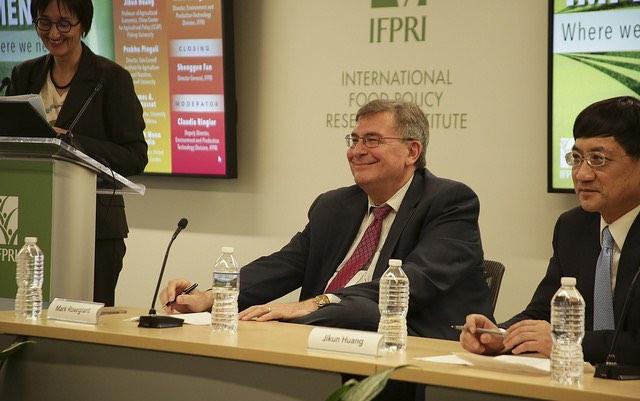IFPRI marked the path-breaking career of Senior Research Fellow and retiring Environment and Production Technology Division (EPTD) Director Mark Rosegrant with a farewell public policy seminar April 5 featuring rapid-fire presentations on success stories of improving crop yields.
Rosegrant has been a leader in evaluating the policy implications of new technologies in agriculture, many of which have contributed to agricultural sustainability and increased yields in countries around the world, said Saharah Moon Chapotin, executive director of the United States Botanic Garden. Rosegrant, whom speakers repeatedly called a “giant in the field,” is the author or editor of more than 20 books, 60 book chapters, and over 100 peer-reviewed papers on agricultural economics, water resources, and food policy analysis. His publications are the most cited at IFPRI, with more than 21,000 citations over the course of his nearly 4-decade career.
Rosegrant noted that his field has changed continuously since he started work at IFPRI in 1980. Technologies have evolved and altered the broader landscape of agriculture—and will continue to do so in the coming years.
Presenters explored some of these changes, assessing the future of agricultural policy and how stakeholders can improve yields to create equitable, sustainable food systems. Speaking on his collaborations with Rosegrant and IFPRI, James W. Jones, director of the Florida Climate Institute, highlighted the success that is possible when biophysical and social scientists work together to achieve lasting yield growth.
Prabhu Pingali, director of the Tata-Cornell Institute for Agriculture and Nutrition at Cornell University, said that it is not sufficient to simply increase yields of the “big three”—corn, wheat, and maize—but also to conduct research on high-value crops such as fruits and vegetables and promote diversification. “The time is right to make the transition from a staple grain processed agricultural system to an agricultural system that promotes diversity, nutrition, increased wealth, growth in incomes, through diversity and increase in high-value crops,” said Pingali.
Morven McLean, executive director of the International Life Sciences Institute Research Foundation, agreed that the future of increasing yields lies in diversification. Increasingly, she said, crop innovations in will occur at the nexus of genetic modification and gene editing, leading to better yields and nutrition.
While biotechnology offers the promise of more plentiful yields, that can negatively affect prices, said Jikun Huang, professor of agricultural economics at the China Center for Agricultural Policy at Peking University. Among his key recommendations: Invest in less developed countries that have low yields and make more financially sustainable investments in countries with high yields.
James A. Roumasset, professor emeritus, University of Hawai’i-Manoa, said that donors and investors should take care that their money is spent in ways that increase benefits for residents of developing countries relative to cost. By promoting what he calls “principled populism,” he suggested that investments should help to build the legal and physical infrastructure to support sustainable development.
Considerable advances have been made in boosting crop yields, and a diversified and sustainable food systems approach remains at the core of IFPRI’s research agenda, IFPRI Director General Sheggen Fan said in his concluding remarks. Fan commended Rosegrant for a career that is the hallmark of a successful researcher and great manager.
Rosegrant attributed his success to the support of numerous mentors who offered him the opportunity to explore the discipline from an early age. “Having that freedom to grow and make your own way, while contributing to the good of all, is the definition of a great career,” he said.
Rosegrant was recently appointed the interim chair of IFPRI’s Peer Review Committee and in that capacity, will continue to ensure quality and efficiency in IFPRI publications.
Shelleka Darby is an IFPRI Communications Intern.







